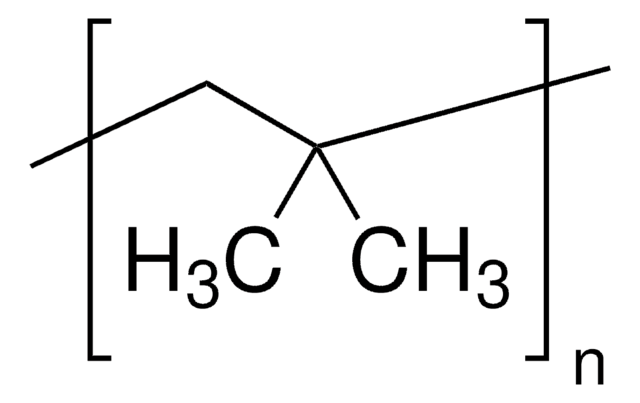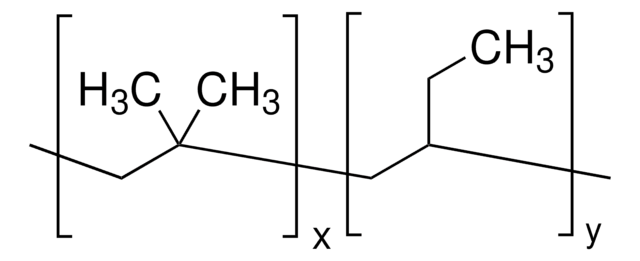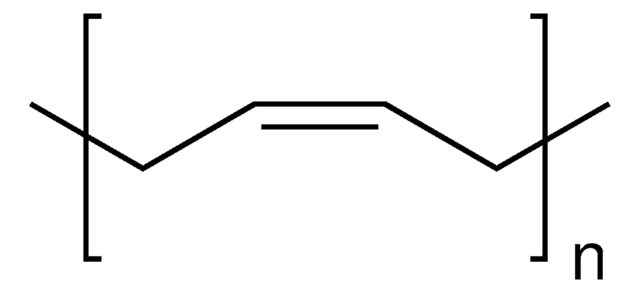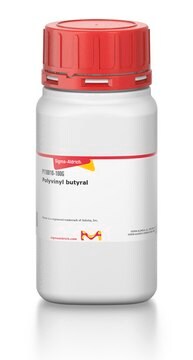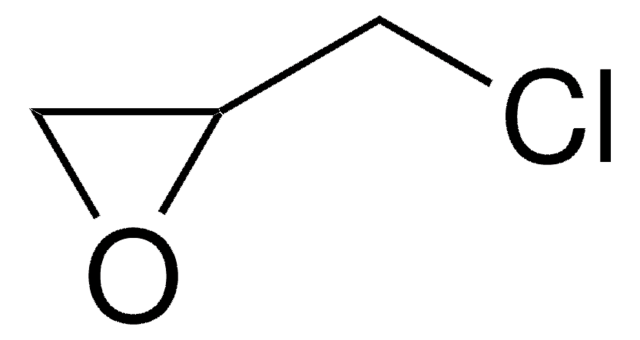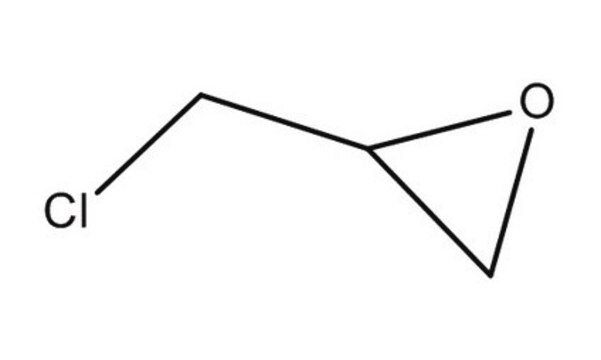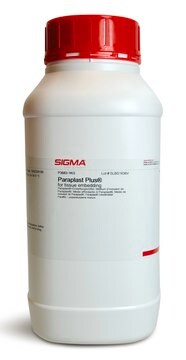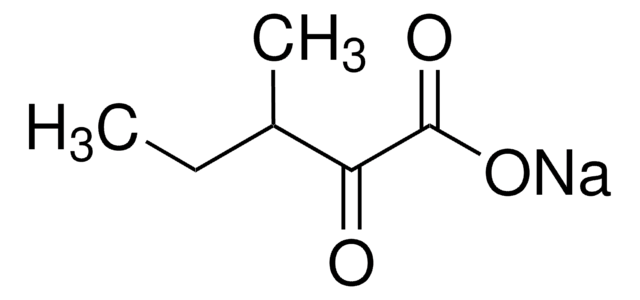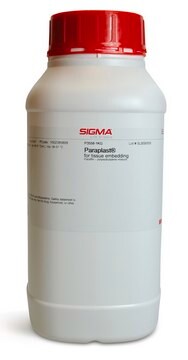181463
Polyisobutylene
average Mw ~1,000,000, average Mn ~600,000 by GPC/MALLS, average Mv ~1,200,000
Iniciar sesiónpara Ver la Fijación de precios por contrato y de la organización
About This Item
Fórmula lineal:
[CH2C(CH3)2]n
Número de CAS:
Número MDL:
Código UNSPSC:
12162002
ID de la sustancia en PubChem:
NACRES:
NA.23
Productos recomendados
Formulario
solid (or Chunk(s))
Nivel de calidad
mol peso
average Mn ~600,000 by GPC/MALLS
average Mv ~1,200,000
average Mw ~1,000,000
contiene
500 ppm BHT as stabilizer
color
colorless, or white
índice de refracción
n20/D 1.51
densidad
0.92 g/mL at 25 °C (lit.)
cadena SMILES
CC(C)=C
InChI
1S/C4H8/c1-4(2)3/h1H2,2-3H3
Clave InChI
VQTUBCCKSQIDNK-UHFFFAOYSA-N
¿Está buscando productos similares? Visita Guía de comparación de productos
Aplicación
- The use of polyisobutylene-based polymers in ophthalmology: Discusses the application of polyisobutylene-based polymers in ophthalmologic devices, highlighting its potential in biomedical applications (L Pinchuk, 2022).
- Synthesis of a polyisobutylene-tagged fac-Ir (ppy) 3 complex and its application as recyclable visible-light photocatalyst in a continuous flow process: Presents a novel use of polyisobutylene as a support for photocatalysts, enhancing recyclability and efficiency in light-driven chemical reactions (D Rackl, P Kreitmeier, O Reiser, 2016).
- Polyisobutylene-based thermoplastic elastomers for manufacturing polymeric heart valve leaflets: In vitro and in vivo results: Explores the use of polyisobutylene-based elastomers in the production of heart valve leaflets, assessing their physical properties and compatibility (E Ovcharenko et al., 2019).
- Polyisobutylene—new opportunities for medical applications: Reviews the potential of polyisobutylene in various medical applications, focusing on its properties and benefits for healthcare materials (D Barczikai et al., 2021).
- Homogeneous and heterogeneous catalysts for the synthesis of highly reactive polyisobutylene: discovery, development and perspectives: Discusses advancements in catalyst technology for producing high-reactivity polyisobutylene, crucial for high-performance materials (IV Vasilenko, SV Kostjuk, 2021).
Código de clase de almacenamiento
10 - Combustible liquids
Clase de riesgo para el agua (WGK)
WGK 3
Punto de inflamabilidad (°F)
Not applicable
Punto de inflamabilidad (°C)
Not applicable
Equipo de protección personal
Eyeshields, Gloves
Elija entre una de las versiones más recientes:
¿Ya tiene este producto?
Encuentre la documentación para los productos que ha comprado recientemente en la Biblioteca de documentos.
Los clientes también vieron
C Götz et al.
Journal of the mechanical behavior of biomedical materials, 10, 206-215 (2012-04-24)
This study examines the morphology, thermal, quasi-static and long-term dynamic creep properties of one linear and three arborescent polyisobutylene-based block copolymers (L_SIBS31, D_IBS16, D_IBS27 and D_IBS33). Silicone rubber, a common biopolymer, was considered as a benchmark material for comparison. A
Hong Seok Choi et al.
Langmuir : the ACS journal of surfaces and colloids, 28(1), 849-854 (2011-11-25)
The optical properties of polymeric materials, such as transmission loss and the thermo-optic coefficient, determine their utility in numerous applications, ranging from nanotechnology to the automotive and aerospace industries. However, because of the wide variation in the physical properties of
Ivan Yu Eremchev et al.
Physical chemistry chemical physics : PCCP, 13(5), 1843-1848 (2010-12-25)
Numerous experiments have shown that the low-temperature dynamics of a wide variety of disordered solids is qualitatively universal. However, most of these results were obtained with ensemble-averaging techniques which hide the local parameters of the dynamic processes. We used single-molecule
Deniz C Tuncaboylu et al.
Langmuir : the ACS journal of surfaces and colloids, 26(10), 7574-7581 (2010-01-29)
Organic-inorganic hybrid materials attract particular interest because of their excellent mechanical properties. Here, we report the synthesis of hybrid cryogels consisting of interpenetrated polyisobutylene and silica networks. The gels were prepared by cross-linking of butyl rubber in cyclohexane containing silica
Corinne Vebert-Nardin
Chimia, 65(10), 782-786 (2011-11-08)
With this article, we wish to give an overview of our main research activities assessing the potential of a suitable polymer modification of DNA fragments to self-assemble biologically active nanostructures. Specifically, the grafting of a hydrophobic polymer segment on DNA
Nuestro equipo de científicos tiene experiencia en todas las áreas de investigación: Ciencias de la vida, Ciencia de los materiales, Síntesis química, Cromatografía, Analítica y muchas otras.
Póngase en contacto con el Servicio técnico